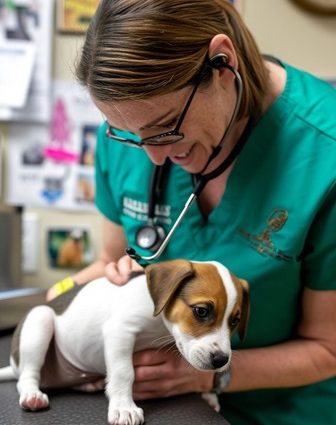Determining the right time for your pet to have dental work can be challenging for pet owners. Like humans, pets require proper oral care to maintain overall health and well-being. Recognizing the signs that your pet might need dental attention—such as bad breath, difficulty eating, or visible plaque and tartar—can help you ensure your furry friend stays healthy and happy. Early detection and intervention are key to preventing more severe health issues.
If left untreated, dental issues can lead to pain, infections, and other serious health problems. Knowing when it’s time for your pet to have dental work can help prevent these issues and maintain its health and quality of life. This guide outlines key signs and considerations to help you determine when your pet needs dental care.
1. Bad Breath
One of the most common indicators that your pet may need dental work is persistent bad breath. While occasional bad breath can be expected, a constant foul odor can signify dental disease. Bacteria buildup in the mouth can lead to bad breath, indicating that your pet may have plaque, tartar, or an infection requiring professional dental care. This is where veterinary dentistry becomes essential, as it’s the specialized field equipped to effectively address and treat such dental issues in pets.
2. Visible Tartar and Plaque Buildup
Regularly checking your pet’s mouth can help you identify visible signs of tartar and plaque buildup on their teeth. Tartar is a hardened form of plaque that appears as a yellow or brown coating on the teeth. If left untreated, it can lead to periodontal disease. Professional dental cleaning is necessary to remove this buildup and prevent further oral health issues.
3. Red or Bleeding Gums
Healthy gums should be pink and firm. Red, swollen, or bleeding gums are signs of gingivitis or periodontal disease. If you notice these symptoms, it’s essential to seek veterinary care. Dental work, including cleaning and possibly more advanced treatments, can help restore your pet’s gum health and prevent tooth loss or infections.
4. Difficulty Eating or Chewing
If your pet is experiencing difficulty eating or chewing, it may be due to dental pain. Watch for signs such as dropping food, chewing on one side of the mouth, or avoiding hard foods. These behaviors can indicate dental issues such as broken teeth, abscesses, or severe periodontal disease that require immediate attention from a veterinarian.
5. Pawing at the Mouth
Pets often paw at their mouths when they are experiencing dental discomfort. This behavior can indicate tooth pain, mouth sores, or other oral health problems. If your pet is frequently pawing at their mouth, it’s time to schedule a dental examination with your vet to identify and treat the underlying issue.
6. Loose or Missing Teeth
Loose or missing teeth are clear signs that your pet needs dental work. These symptoms can result from advanced periodontal disease or trauma to the mouth. Immediate veterinary care, including veterinary surgery, is necessary to address these issues and prevent further damage or infection. In some cases, extractions or other dental procedures may be required.
7. Excessive Drooling
While some drooling is normal for certain breeds, excessive drooling can indicate dental problems. If your pet suddenly starts drooling more than usual, it could be due to oral pain or difficulty swallowing caused by dental disease. A thorough dental check-up can help determine the cause and provide the necessary treatment.
8. Facial Swelling
Swelling on your pet’s face, especially around the mouth or jaw, can signify a dental abscess or infection. Dental abscesses are painful and can lead to more severe health issues if not treated promptly. Veterinary intervention, including dental work and antibiotics, is crucial to resolving the infection and preventing complications.
9. Behavioral Changes
Behavioral changes such as increased irritability, reluctance to play, or hiding can indicate dental pain or discomfort. Pets often hide their pain, so any noticeable changes in behavior should prompt a dental examination. Identifying and treating dental issues can improve your pet’s comfort and quality of life.
10. Annual Dental Check-ups
Even if your pet shows no apparent signs of dental issues, regular dental check-ups are essential for maintaining oral health. Annual veterinary dental exams can help detect problems early before they become serious. To maintain your pet’s overall well-being, this vet recommends routine cleanings and preventive care to keep your pet’s teeth and gums healthy, avoiding needing more extensive dental work.
Final Thoughts
Regular monitoring and proactive care are crucial to maintaining your pet’s dental health. Recognizing the signs that indicate the need for dental work can prevent painful conditions and severe health issues. By providing timely dental care and scheduling regular check-ups, you can maintain your pet’s oral health and overall well-being, allowing them to live healthier and happier lives.

